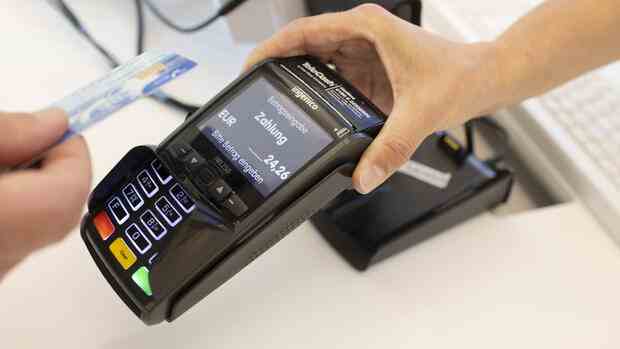Since 1990, merchants have had to pay a fee of 0.3 percent of the turnover to their bank for a customer’s giro or EC card payment.
(Photo: imago images/photothek)
Frankfurt In the dispute over possible repayments of excessive Girocard fees, the German banks have largely prevailed. The Berlin Regional Court dismissed claims for damages from several retailers and other companies in most cases on Thursday.
The court ruled that the banks violated antitrust law. However, in most cases, either no damage relevant to antitrust law could be determined or the claim was time-barred, according to a statement from the court. Only a few companies were awarded damages by the court.
Specifically, it was about the fact that merchants had to shell out a certain fee, a small percentage of the turnover, for Girocard payments. This total of 0.3 percent of the transaction volume, but at least eight cents, went to the respective banks.
In the spring of 2014, the financial institutions ended this procedure under pressure from the Federal Cartel Office. One of the issues before the court was whether the uniform dealer fee was an illegal cartel agreement.
A total of around a dozen companies, including Rossmann, Deichmann, Jet filling stations as well as Deutsche Bahn and Deutsche Post, had to pay compensation for what they considered to be excessive fees for just those payments with the Girocard (better known by the old name “EC card “) required.
The lawsuits largely relate to the period from 2004 to 2014. The first lawsuits were filed in 2017 at the latest. According to observers, the total amount requested could be 100 million euros.
Rossmann gets nothing
According to the dpa, the drugstore chain Rossmann alone demanded around 8.5 million euros in damages. However, the company’s lawsuit was unsuccessful. From the point of view of the court, Rossmann did not sufficiently explain that he suffered damage and in what amount.
However, Deichmann was at least partially successful. The shoe retailer was awarded more than 350,000 euros in damages plus interest. “We are pleased that the court basically followed our reasoning,” said a spokesman. “The banks agreed on prices and in this way demanded too high Girocard fees from retailers. Unfortunately, from the point of view of the court, some of our claims are already statute-barred.
A detailed reasoning for the judgment was initially not available. A spokesman for Deutsche Post said that the company would first analyze the reasons for the verdict and then decide how to proceed.
>> Read here: This means a commission ban for banks and investors
“The Berlin Regional Court surprisingly dismissed DB’s claim for damages after five years of proceedings,” said a spokeswoman for Deutsche Bahn. In DB’s opinion, the court’s decision was not tenable. As soon as the judgment is available, the company will therefore examine the extent to which a correction by the court of appeal is indicated.
The German banks, however, see themselves as confirmed, as their joint interest group explained: “The assessment of the German banking industry that the plaintiffs were not harmed has been essentially confirmed by the court,” said a spokesman. In the event of significantly different verdicts, they will first wait for the reasoning of the court and evaluate the reasons for the decision.
Consumers in Germany are increasingly paying with the Girocard. Although cash payments still dominate in terms of the number of transactions, they have been declining for years.
More: Another record for cashless payment with the Girocard
